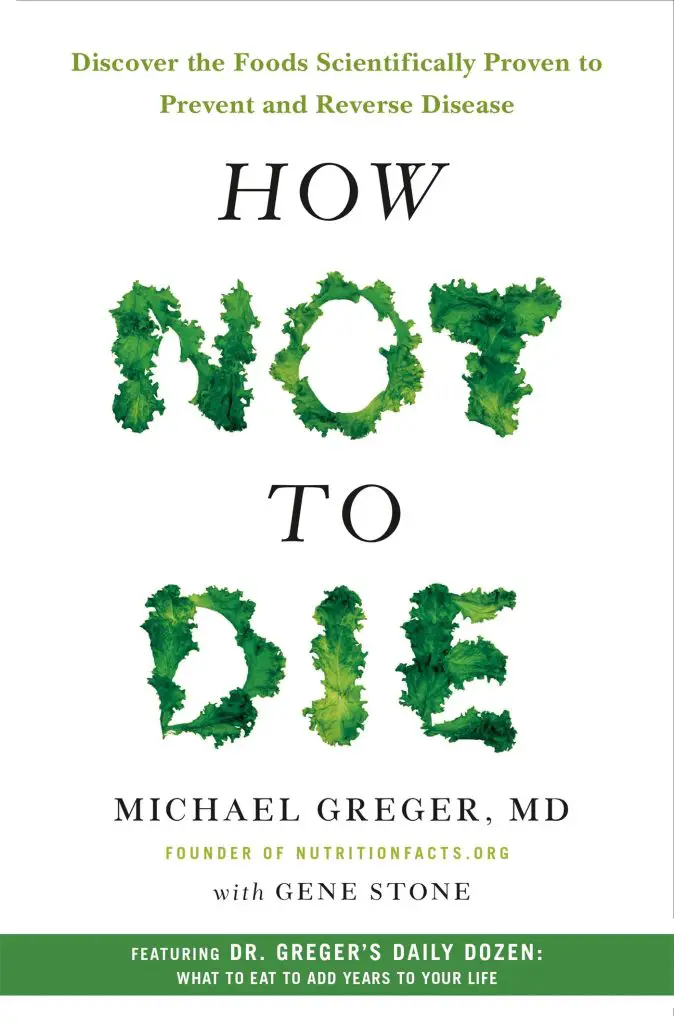Introduction
In this fifth part of my multi-part series, “Definitive Classics: Influential Books on Health in the Last 10 Years,” I review the international best-seller by Michael Greger “How Not to Die”.
In today’s blisteringly fast-paced world, where convenience often takes precedence over health, Michael Greger’s “How Not to Die” offers a refreshing perspective on the power of nutrition. This enlightening book takes readers on a transformative journey, revealing the crucial link between our food choices and the prevention of chronic diseases.
How Not To Die – Discovering the Power of Nutrition
Greger dives deep into the profound impact of diet on our overall well-being. He presents compelling evidence that poor nutrition is a leading cause of life-threatening diseases like heart disease, diabetes, and cancer. By unveiling the link between what we eat and our health outcomes, Greger compels readers to reevaluate their dietary habits and embrace a more conscious approach to nourishment.
Insights from Scientific Studies
Throughout “How Not to Die,” Greger draws from an extensive body of scientific literature to support his claims. He masterfully weaves together studies that demonstrate the preventive and therapeutic potential of plant-based diets. This inclusion of rigorous research not only bolsters his arguments but also enables readers to trust in the validity and reliability of the information presented.
Empowering Readers
One of the book’s most significant strengths lies in its ability to empower readers with knowledge and practical advice. Greger not only highlights the detrimental effects of an unhealthy diet but also provides clear guidelines on incorporating whole plant foods into our daily lives. By doing so, he equips individuals with the tools they need to take control of their health and make informed decisions about what they eat.

Concise and Actionable Information
“How Not to Die” distinguishes itself by offering concise and actionable information. Greger condenses complex nutritional science into easily digestible chapters, making it accessible to readers of all backgrounds. The book’s organization, with subheadings and bullet points, further enhances readability, enabling readers to navigate the material effortlessly. Greger’s writing style is engaging and approachable, allowing for a seamless reading experience.
Exploring Specific Diseases
One notable aspect of the book is its exploration of specific diseases and the role that nutrition plays in their prevention and management. Greger delves into various conditions, such as cardiovascular disease, diabetes, and cancer, offering in-depth analyses of their underlying causes and presenting compelling evidence to support the implementation of a plant-based diet as a powerful preventive measure.
The Heart-Healthy Diet
In a dedicated chapter, Greger delves into heart disease, the leading cause of death worldwide. He sheds light on the detrimental effects of a typical Western diet and presents evidence demonstrating that adopting a plant-based diet can significantly reduce the risk of developing heart disease. He goes beyond generalities and provides practical suggestions for incorporating heart-healthy foods into everyday meals, emphasizing the importance of whole grains, legumes, fruits, and vegetables.
The Power of a Plant-Based Diet
Another focus of “How Not to Die” is the transformative potential of a plant-based diet in combating diabetes. Greger explores the detrimental effects of excessive meat and dairy consumption on blood sugar regulation and highlights the positive impact of plant-based eating patterns on preventing and managing diabetes. He provides readers with valuable insights into the benefits of consuming whole foods, avoiding processed ingredients, and prioritizing a plant-centric approach to eating.
Nourishing the Body and Preventing Cancer
Within the pages of “How Not to Die,” Michael Greger embarks on a profound exploration of the vital role that nutrition plays in preventing cancer. By unveiling the intricate connection between dietary choices and cancer risk, Greger equips readers with knowledge and actionable strategies to cultivate a healthy lifestyle.

Understanding the Cancer Connection
Greger navigates the complex terrain of cancer prevention, unraveling the mechanisms through which diet influences the development and progression of this formidable disease. With scientific rigor and clarity, he distills intricate research into digestible insights, enabling readers to comprehend the profound impact of their food choices on cancer risk.
Harnessing the Power of Plant Foods
Central to Greger’s narrative is the extraordinary potential of plant-based foods to shield against cancer. He illuminates the diverse array of phytochemicals, antioxidants, and bioactive compounds found in these nourishing foods that can inhibit the growth of cancer cells and support overall well-being. Greger’s meticulous analysis empowers readers to embrace a rich, plant-centric diet as a means of fortifying their defenses against cancer.
The Role of Cruciferous Vegetables
Greger sheds light on the particular prowess of cruciferous vegetables, such as broccoli, kale, and Brussels sprouts, in cancer prevention. These nutritional powerhouses activate detoxification enzymes, neutralize carcinogens, and foster cellular repair processes, collectively contributing to a reduced risk of various types of cancer. Greger provides practical guidance on incorporating these vibrant vegetables into daily meals, amplifying their beneficial impact.
Food Synergy: Enhancing Cancer Protection
Delving deeper into the interplay of nutrients, Greger explores the concept of food synergy—the notion that the combination of diverse nutrients in whole plant foods produces more potent effects than isolated components. By consuming a varied and colorful array of whole plant foods, individuals can tap into this synergy, maximizing the protective benefits against cancer and promoting optimal health.
The Detrimental Effects of Processed Meats
Greger unearths the alarming consequences of consuming processed meats, such as bacon, sausages, and deli meats, in relation to cancer risk. With compelling evidence, he elucidates the link between processed meat consumption and increased susceptibility to colorectal, pancreatic, and stomach cancers. Armed with this knowledge, Greger urges readers to make informed choices, opting for plant-based alternatives to safeguard their well-being.

Navigating the World of Supplements
While Greger emphasizes the significance of obtaining nutrients from whole plant foods, he acknowledges certain circumstances where supplementation may be beneficial. He explores the potential advantages of specific supplements, such as vitamin B12 and vitamin D, for individuals following plant-based diets or those with specific health conditions. However, he stresses the importance of informed decision-making, highlighting the necessity of consulting healthcare professionals to ensure appropriate supplementation.
Strengthening the Body’s Defenses and Enhancing Longevity
As we delve further into the captivating exploration of “How Not to Die” by Michael Greger, the focus expands to encompass strategies for strengthening the body’s defenses and promoting longevity. Greger’s evidence-based approach empowers readers to make informed choices that optimize their well-being and enhance their chances of living a long, vibrant life.
The Power of Immune-Boosting Foods
In this section, Greger emphasizes the crucial role of a well-functioning immune system in warding off diseases and maintaining optimal health. He dives into the science behind immune-boosting foods, such as fruits, vegetables, mushrooms, herbs, and spices, which contain a wealth of nutrients, antioxidants, and phytochemicals that enhance immune function. Greger provides practical insights on incorporating these foods into daily meals to fortify the body’s natural defenses.
Plant Foods and Bone Health
Greger devotes considerable attention to the relationship between nutrition and bone health. Contrary to popular belief, he highlights how animal-based diets, particularly those high in animal protein, can have adverse effects on bone health. Drawing from scientific research, Greger elucidates the beneficial impact of plant-based diets on bone density and fracture prevention. Through informed dietary choices and an emphasis on plant-based calcium sources, readers can nurture strong and resilient bones.
Optimizing Brain Health
Cognitive decline is a growing concern, and Greger delves into the connection between nutrition and brain health. He explores the impact of a plant-based diet, rich in fruits, vegetables, whole grains, nuts, seeds, and legumes, on reducing the risk of age-related cognitive decline and neurodegenerative diseases such as Alzheimer’s. Greger’s evidence-based recommendations empower readers to prioritize brain-healthy foods and embrace a nourishing lifestyle for long-term cognitive well-being.

The Role of Exercise and Stress Reduction
Recognizing the multifaceted nature of health, Greger goes beyond nutrition to address the significance of exercise and stress reduction in promoting longevity. He highlights the benefits of regular physical activity and its positive impact on overall health, disease prevention, and longevity. Additionally, Greger offers practical advice on stress management techniques, emphasizing their importance in supporting a resilient mind and body.
Embracing a Whole-Food, Plant-Based Diet
Throughout the book, Greger consistently advocates for a whole-food, plant-based diet as the cornerstone of optimal health and longevity. By consuming a diverse array of colorful plant foods and minimizing processed foods, individuals can harness the full spectrum of nutrients and bioactive compounds that promote vitality and protect against chronic diseases. Greger’s evidence-based approach leaves readers equipped with the knowledge and motivation to embrace this transformative dietary paradigm.
Empowering Readers to Take Control of Their Health
In the final part of our exploration of “How Not to Die” by Michael Greger, we delve into the empowering message that resonates throughout the book. Greger encourages readers to take control of their health by making informed choices, embracing a plant-based lifestyle, and becoming advocates for their well-being.
Becoming Informed Advocates
One of the key strengths of Greger’s book lies in its ability to transform readers into informed advocates for their own health. Through his meticulous research and presentation of scientific evidence, he equips individuals with the knowledge to question conventional wisdom and critically evaluate the information they receive. By encouraging readers to be proactive in seeking reliable sources of information, Greger empowers them to make educated decisions about their dietary choices and overall health.
Challenging the Status Quo
“How Not to Die” challenges the prevailing dietary norms and cultural beliefs that perpetuate unhealthy habits. Greger sheds light on the influence of powerful industries and their impact on public health. By exposing the conflicts of interest and biases within the healthcare system, he encourages readers to question the status quo and consider the potential consequences of their dietary choices on their long-term well-being.

Inspiring Personal Transformation
Throughout the book, Greger shares numerous success stories of individuals who have transformed their lives through dietary changes. These firsthand accounts serve as powerful inspirations for readers, demonstrating that it is never too late to take control of one’s health and make positive changes. By showcasing the potential for personal transformation, Greger instills hope and motivates readers to embark on their own health journey.
Practical Guidance for Implementation
Greger recognizes that knowledge alone is not enough; actionable guidance is essential for sustainable change. In “How Not to Die,” he provides practical tips, recipes, and meal plans that make transitioning to a plant-based lifestyle more manageable. By offering concrete strategies for incorporating whole plant foods into everyday meals and navigating various social situations, Greger sets readers up for success on their path to optimal health.
Promoting Compassion and Sustainability
In addition to individual health, Greger emphasizes the broader implications of dietary choices for animal welfare and the environment. He highlights the ethical and environmental benefits of adopting a plant-based diet, encouraging readers to consider the interconnectedness of their choices. By promoting compassion towards animals and advocating for a more sustainable food system, Greger inspires readers to contribute to a healthier planet.
Celebrating the Joy of Food
While the book delves into the science and evidence behind optimal nutrition, Greger also recognizes the importance of enjoying food. He encourages readers to explore the vast array of flavors, textures, and culinary possibilities offered by a plant-based diet. By emphasizing the joy and creativity of plant-based cooking, Greger fosters a positive and sustainable relationship with food that extends beyond mere sustenance.
Conclusion
“How Not to Die” by Michael Greger is a transformative and empowering guide that provides readers with the knowledge, tools, and motivation to take control of their health. Through the exploration of evidence-based nutrition, challenging prevailing beliefs, and offering practical guidance, Greger equips individuals to make informed choices that promote longevity, prevent chronic diseases, and contribute to a more compassionate and sustainable world. With his captivating storytelling and unwavering dedication to the pursuit of optimal health, Greger’s book leaves readers inspired to embark on their own transformative journey towards vibrant well-being.
The impact of “How Not to Die” extends beyond the pages of the book. Greger’s work has inspired a global community of individuals who are committed to transforming their lives and advocating for positive change. Through his website, lectures, and online platform, Greger continues to engage with his audience, providing ongoing support, guidance, and the latest research to help individuals make informed decisions on their health journey.
Thinking of becoming more healthy? Read my article: Best Health Tracker Apps in 2023

If you enjoyed reading this review, please take a look at the others in my series, “Definitive Classics: Influential Books on Health in the Last 10 Years.”
Exposed Secrets Of “The Obesity Code” – The Best Review
Empowering Health: Unlocking the Truths of The Plant Paradox
Your Better Brain Health: “Genius Foods”: The Official Review
Unlock The Circadian Code – The Secret of a Vibrant Life

Systems Engineer > Project Manager > Tech Entrepreneur > Health Consultant > Website Specialist
